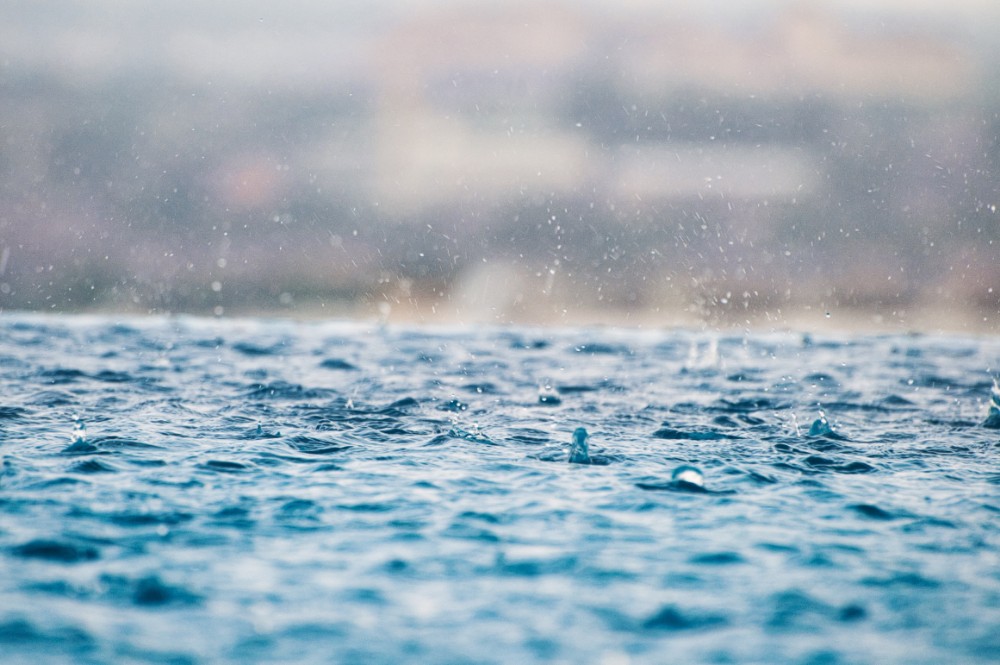It’s a function of summer in the south that we get these pop-up thunderstorms that roll in late in the afternoon. It’s as if the sky gets fed up with the humidity and can’t hold it in anymore. If you’ve ever been to the beach in Alabama or Florida or Mississippi, you’ve seen it coming. The dark clouds way out over the water, the little breeze that kicks up, and then the sheet of fat, tepid raindrops that wooshes down of a sudden.

Photo by Max Rovensky on Unsplash
(When you’re a swimmer, you call these storms blessed for the reprieve they bring you from grueling two-a-day practices. When you’re a kid just there for swim lessons, you call them cursed for ruining your fun.)
I can picture the hallway at the YMCA where I practiced that led to the outdoor pool. It was lined with benches and tiny doors to racquetball courts, and as we all sat there hoping the storm would last long enough for practice to be called off, middle-aged men clad in terry cloth headbands and tiny shorts would scoot by us with quizzical looks on their way into those echoey rooms. It was air-conditioned, so we sat there miserable and cold in our damp swimsuits.
I have swum in the rain. You’re wet anyway, so a little precipitation was never enough to stop us. I have stood on the blocks waiting patiently for the start with drops splashing down onto my back, the picture of sheer concentration. I have swum in the cold, steam rising off of the pool whose bubble had been taken down prematurely, dashing across the concrete tundra to the towel waiting in your mom’s arms. But thunder is where it ends.
My coach had a little device that supposedly measured electricity in the air and could let us know when it was time to get out of the water. We would eke every possible second out of practice that we could. And then the rule was that we had to sit out at least 30 minutes after the final clap of thunder. As the minutes ticked by, we would cross our fingers for one more, and it usually came.
Some indoor pools are grounded, so you can keep swimming. There were stories of the natatorium in Biloxi being struck by lightning and it arcing dramatically around the roof. I never saw it, but I did swim there in pounding rain.
The Meridian pool was outdoor, and the July timeline of its annual meet meant a storm was practically inevitable. There weren’t many places to go, so we would huddle onto the concrete-covered patio in between the locker rooms, or some of us into the grimy locker rooms themselves (no boys allowed). The wind from even a warm summer storm can bring a chill, and I remember standing there in the eery semi-dark with rain drops whipping in at us, waiting for the call: would we swim again, or not? Someone’s dad would usually make a McDonald’s run.
Another meet in Clinton, the storm blows in before we warm up and we huddle in our cars. Eventually the word comes: no meet today. We drive home past toppled-over street signs and stoplights. Apparently a tornado had touched down.
You take for granted the weather phenomena of the place you call home. I’ve always been skittish of tornados, and more-so since the spring of 2011 when we lost power for a week in a county ravaged by them, but they’ve been a fact of my life. I know what to do, for as much as it can help.
The summer I turned 15 I went to poetry camp in southern California, up on a mountain. There had been a drought (the stalls in our bathrooms had signs instructing us, “If it’s yellow, let it mellow. If it’s brown, flush it down.”) and a forest fire was raging nearby. I guess it was approaching the base of the mountain, and there was smoke in the air as we went about our days. A firetruck parked calmly near one of the main camp buildings. I went one evening to a play put on by the kids there for theatre camp and I remember shaking with nerves. A forest fire was completely foreign to me. My fellow campers from SoCal thought nothing of it; they counted on its not making its way up the mountain and assumed we were safe.
Sometimes the weather is a character in the story of your life, and other times it’s just a setting or a prop and recedes into the background. Those summer storms felt alive to me, as if they had power over when they would drop the first rain and when the first thunderclap would boom, as if they waited until the start of our 4:30 practice on purpose, for our sake. They determined for me how I might spend hours of my day, a foil to my own self-determination.
A summer storm blew in, and we would wait.